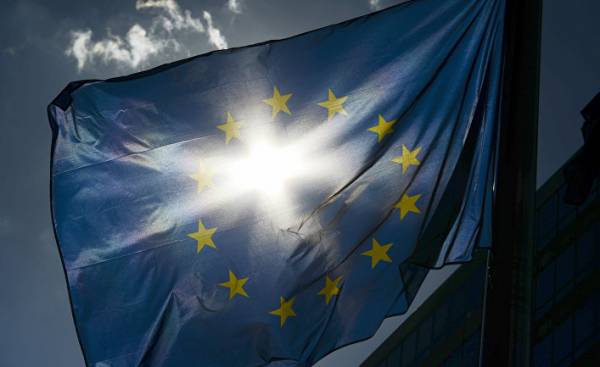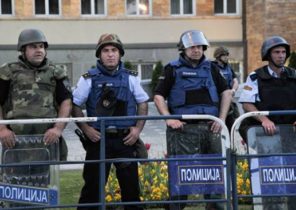
March 25, 1957 six European countries, over which still hung the shadow of world war II, signed a Treaty establishing the international club of the new type. The European Union, as this club was subsequently called, achieved success on such a scale, of which its founders hardly could think of: he became not only the basis for peace on the continent — thanks to him, there was a single market and single currency, with the development of six to 28 members he brought under his wing the South of the country after the collapse of dictatorships and the countries of the former Communist bloc in the East. However, if you are going to Rome this weekend, 25-26 March, European leaders know that their project is in trouble.
He was faced with both internal and external threats. Internal problems have become evident during the Euro crisis, and they still await their resolution. Prolonged economic difficulties also contributed to the reduction of EU support. The party of populists and eurosceptics oppose the very existence of the EU, particularly in France, where marine Le Pen is so uncomfortable for Europe’s success is pursuing his presidential campaign, despite the fact that she is unlikely to win the elections in may. While the most acute result of the anti-European movement is Brakcet. Prime Minister Theresa may will not come to Rome for the celebration of the anniversary; 29 may, she plans to use article 50 of the EC Treaty to initiate the process of Breccia. Negotiations on the withdrawal of Britain will take a lot of time and energy in the next two years; the loss of such an important member also causes a very severe blow to the influence and authority of the Union.
From outside the EU are also considerable pressure. The refugee crisis is a little verse, but mainly thanks to the ingenious deal with Turkey. The face once again using the aggression of Russia Vladimir Putin and Donald trump, the President of America, who enthusiastically applies both to EU and to NATO, this is most unfortunate time, when Europe could show their weakness and division. There is a bitter irony in the fact that the project created to maintain security in postwar Europe, has failed when the security is threatened. It can also serve as a reminder of how much is at stake, if Europe will not be able to restore itself.
Unite the Union
The traditional reaction of the supporters of the EU on such issues were calls for unity within the Union. They claim that it will benefit the Euro, if it persists. Similarly, according to them, power must shift to the center, which will allow the EU to strengthen its external borders and to ensure unity in the confrontation with such people as Mr. Putin and Mr. trump. However, it is clear that neither European citizens nor their elected government do not want this. If anything, that public opinion shows a preference for the opposite trends.
If the unity of the Union is impossible, the other tradition of Brussels have somehow to cope. The Euro crisis has experienced its peak, as an immigration crisis, and therefore with PACSICOM somehow everything will be solved. If, after this year’s election, the President of France will be Emmanuel macron and German Chancellor Angela Merkel and Martin Schulz, the community will be under a strong Pro-European leadership. However, there are some risks. Re the financial crisis able to undermine the Euro, or the election of another government that wants to hold a referendum on EU membership or the Euro, might be the reason for the split of the European Union.
Is there any better alternative? The answer, as stated in our special report, is to more formally than now to seek a much more flexible EU. On euroasic this means the adoption of a “tiered” system in which countries is much more extensive of Europe to different degrees take part in it and relatively easy to move from one level to another.
Great British escape
Recently much interest in the concept of “high-speed” Europe. Most of the leaders of the EU mean by this term that the countries-members of the “core” of Europe should be able to pursue a common policy in areas such as defence, taxation and policy in the field of social security. This implies that all countries move in the same direction. More extensive, multi-tiered Europe would find a place for those countries that are not members. The continent consists of 48 countries and 750 million people, not only the 28 countries and 510 million people belonging to the Union, still less than 19 countries and 340 million people — belong to the Euro area.
At the core of Europe will be those countries that use the single currency. In order to cope with illnesses of the Euro, they will require greater integration and joint institutions — from a proper banking Union to the General credit instruments. Next tier will have to accommodate a wider compared to the current range of EU member States that are not ready to accept the surrender of sovereignty necessary for joining the Euro zone. Some many years will not dare to do so, and, perhaps, should never do.
In addition, a multi-tiered Europe must accept into their fold from different countries. It means rather a change of Outlook than to change the treaties: the language of the Eurocrats, it refers to the agreement on a menu a La carte, not a set lunch. In Brussels it is perceived as a plague, there is the idea that you can choose those pieces of the EU, what you want, not welcome, but that’s what more and more Europeans want. Countries such as Norway or Switzerland, may want to retain their ties with the European single market. Others, such as the UK, may not be ready to accept the rules of the single market, but still want to lead as free trade with the EU. They may seek to play a more significant role in other areas, for example, in the field of defense and security. And such areas as Turkey, Western Balkans, Ukraine, Georgia may prefer to keep the same associate status, instead of the current unsatisfactory situation, when they are told about the possibility of becoming full members of the Union, but they also realize that they will never allow to join it.
For the performance of its functions multi-tiered Europe needs a pragmatic attitude to the rules of each layer. The members of the external group may not accept fully the free movement of individuals, for example, but it will not be the reason to hinder their access to the EU single market. Similarly, those countries that do not belong to the core, don’t have to endure any rejection: in the end, including Denmark and Sweden, one of the most successful countries in Europe. You should also find ways of participation of countries with military and diplomatic resources (for example, UK after Breccia) in foreign and defense policy.
To the European project lived another 60 years, the key concept is flexibility in all directions. Similarly, as the UK exits the EU, other country may one day abandon the Euro. Any such steps will be difficult to handle. However, if the Union cannot accept the differentiation, he faces the risk of disintegration.







